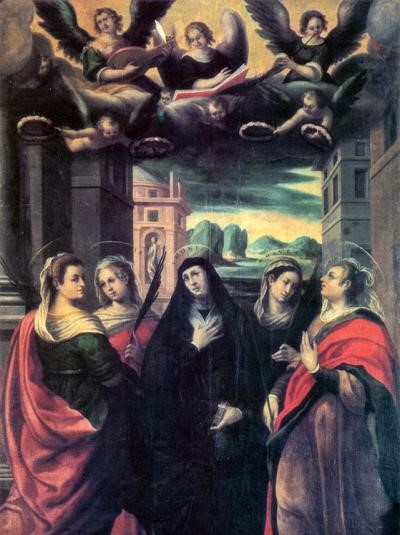
Saint of the Day for 13 February: Saints Fosca and Maura
Saints Fosca and Maura: History and Devotion of the Christian Martyrs of the 3rd Century
Name
Saints Fosca and Maura
Title
Martyrs
Recurrence
13 February
Patrons of
Dueville, Frisanco
Relics place
Church of St. Fosca
Roman Martyrology
In Ravenna, St. Fosca the Virgin and St. Maura her wet nurse, who, in the time of Emperor Decius, having suffered many torments under Dean Quintianus, finally, pierced by the sword, accomplished martyrdom.
The Saint and Mission
Saints Fosca and Maura, through their lives and martyrdom, represent an eloquent witness to the Christian mission lived with extreme courage and dedication. In the context of third-century persecution, their story stands out as a shining example of fidelity to the faith and spiritual endurance in the face of the most extreme adversity. The mission of Phosca and Maura was not characterized by great works or preaching; rather, their very existence and the way they faced martyrdom constitute their mission. Their choice to remain steadfast in the faith, despite the prospect of pain and death, testifies to an unconditional commitment to the Gospel and a deep love for Christ. Their mission is manifested in their ability to witness to the truth of Christianity with their lives, thus becoming beacons of hope and symbols of strength for other believers. The story of Fosca and Maura also highlights the importance of solidarity and mutual support in Christian mission. Their closeness and shared support in times of trial underscore the value of faith community and the power of shared witness. Together, they demonstrate that even in the midst of suffering, faith can create unbreakable bonds that not only sustain the spirit but also inspire and strengthen the larger community. Moreover, their story is a reminder that Christian mission often requires sacrifice and can lead to confrontation with world forces that oppose gospel values. Fosca and Maura embody the conviction that faithfulness to Christ transcends human fear and that true victory is found not in physical salvation but in faithfulness to one’s beliefs until one’s last breath. Saints Fosca and Maura teach us that the Christian mission is a call to live and, if necessary, to die for one’s faith. Their legacy is an invitation to all believers to witness to the Gospel with courage, to support one another in the community of faith, and to remember that true strength is found in the ability to remain faithful to one’s spiritual principles, even in the face of the most difficult trials.
The Saint and Mercy
Saints Fosca and Maura, through the account of their martyrdom, offer a unique and profound perspective on mercy at the heart of suffering. Their courage in the face of martyrdom testifies not only to the strength of their faith but also to the presence of a divine mercy that transcends human understanding. Their story, rooted in the Christian tradition of third-century persecution, becomes a vehicle through which to explore the deeper dimensions of mercy as an expression of faith and hope. The mercy manifested by Phosca and Maura is revealed in their unwavering faithfulness to God despite threats of torture and death. This supreme act of fidelity is imbued with mercy as it reflects a deep love for God that extends even to their persecutors. Their ability to forgive those who condemned them to suffering is a clear indication of the mercy that permeated their hearts, a love that forgives and sees beyond hatred and violence. Moreover, their story illuminates the divine mercy that works through martyrdom. God’s grace is manifested in the strength that enables Fosca and Maura to face their destiny with courage. Their witness thus becomes a sign of God’s mercy, which does not abandon its children in their time of need, but sustains them, offering them the strength to bear witness to the faith even to the point of extreme sacrifice. The story of Fosca and Maura also reminds us that mercy has the power to transform suffering into a means of redemption and grace. Their martyrdom, far from being a defeat, is a victory of mercy over all forms of evil, a triumph of love that conquers death and opens the door to eternal life. Saints Fosca and Maura teach us that mercy is at the heart of the Christian mission, a force that sustains believers in the most difficult trials and transforms martyrdom into an act of supreme love. Their legacy is an invitation to live mercy in all its forms, witnessing with their lives that God’s love is stronger than any suffering, and that the hope found in faith transcends all darkness.
Hagiography
On the outskirts of Venice, one of the most wistfully evocative locations is Torcello, the oldest, and for many centuries the most splendid town in the Venetian lagoon. It was born in the 5th century, when the population of Altinum fled before Attila’s horse. Altinum had been surrounded by turreted walls. In memory of the ancient, the new city was therefore called Turricellum, then Torcello. When, in the time of the Lombards, Bishop Paulinus also transplanted the pastoral there, Torcello expanded and prospered. It became a ” great emporium of trade and…
